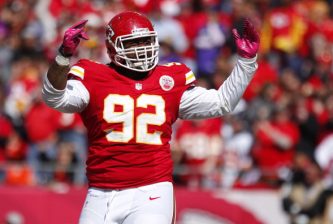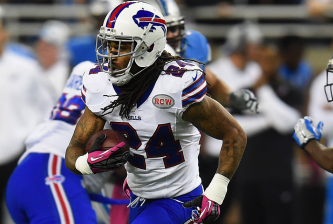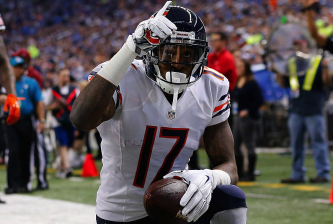The New England Patriots kept their hopes for an undefeated season alive with a 20-13 victory over the Buffalo Bills on Monday night, but the victory was overshadowed by some very questionable officiating calls in the game.
Ben Volin of the Boston Globe was told by an NFL Referees Associating source on Tuesday that the Bills-Patriots officiating crew indeed made some crucial mistakes:
A source from the NFL Referees Association, who has officiated dozens of NFL games, reached out Tuesday morning to gripe about the officiating on Monday night and explain how the crew botched a few calls. The seven-man officiating crew, led by referee Gene Steratore, made at least three crucial mistakes, according to the source:
- An inadvertent whistle that negated a potential touchdown by Patriots receiver Danny Amendola.
- Allowing Patriots running back James White to score a touchdown on a play that should have been whistled dead.
- And running off the final 2 seconds of the game after Bills receiver Sammy Watkins rolled out of bounds.
- The refs gave the Patriots credit for a 14-yard gain and tacked on 15 yards for an interference penalty on the Bills sideline.
“Guys are rolling their eyes over that performance,” the source said of his fellow officials. “That was really bad.”
All of the missed calls mentioned by the source were rulings you were also stunned about if you watched the game, so it’s nice to know you weren’t crazy for thinking these were really bad calls.
And not only were they bad rulings, but they were on potential game-changing plays.
The first play mentioned by the officiating source involved an inadvertent whistle on a Danny Amendola catch in the third quarter that may have resulted in a Patriots touchdown, had a whistle not mistakenly been blown in the middle of the play:
Gene Steratore’s crew chose to spot the ball where Amendola made the catch 14 yards downfield (they also added on another 15 yards due to a Bills personal foul). In addition to mistakenly blowing the whistle, it appears the crew incorrectly chose where to spot the ball according to the officiating source: “They should have just blown the play dead, but were looking to appease both sides.”
Then there was the James White touchdown for the Patriots later in the third quarter that the source claims should have also been blown dead. While the Bills’ Jerry Hughes was late running onto the field, Tom Brady quickly snapped by the ball and handed it to White for a six-yard rushing touchdown. New England should have not been allowed to snap the ball, as Volin explains:
A bird’s eye view of the play shows that Patriots tight end Scott Chandler began running onto the field from the sideline, but quickly reversed course and retreated back to the sideline.
The Bills countered by sending three new players on the field, while Jerry Hughes was looking over to the sideline for instructions and was very late getting back to the new line of scrimmage. When the Patriots snapped the football, the Bills were barely set, and Hughes was 15 yards in the backfield.
Even though the Patriots technically didn’t substitute, the officials should have stood over the ball and not allowed the Patriots to snap it until the Bills were given Bills ample time to get their substitutions into the game and set up their defense, per NFL rule 5.2.10, in which the NFL considers a “simulated” substitution like a normal substitution.
The touchdown also should not have counted because when a player is so far in the backfield, as Hughes was, officials are supposed to whistle the play dead and assess the penalty. But they let the play stand.
Fittingly, the game concluded on another bad call. With the Bills driving near midfield and hoping for a shot at the end zone in a 20-13 game, Sammy Watkins fell down making a catch, but astutely rolled to the sidelines to get out of bounds and seemingly stop the clock with two seconds left. However, head linesman Ed Walker incorrectly ruled that Watkins gave himself up as a runner inbounds, thus letting the clock run and ending the game.
Walker is a second-year NFL referee that previously officiated in the PAC-12, and the officiating source claims Walker used the college rule where the clock keeps running if it’s deemed a runner gave himself up:
The source said Walker mistakenly applied the college rule instead of the NFL rule. Just because Watkins went backward does not mean he gave himself up as a runner; running sideways or backward is still considered trying to “advance” the football. For the runner to surrender himself, he has to truly give up on the play — such as when a quarterback slides before taking a hit.
“In the NFL, the way it’s always been officiated is if a guy gets out of bounds, you give it to him and stop the clock,” the source said. “But he called it like the college rule. I’m not sure he knew the NFL rule.”
Officiating mistakes are going to happen with human beings (bring in the robots), but these were some embarrassing, inexcusable rulings that likely made a big difference on the score of the Bills-Patriots game, if not the overall outcome.
These aren’t instances of seeing if a player’s knee hit the ground, determining where a punt landed out of bounds, or missing a linebacker grab a ball-carrier’s facemask. These are basic rules of the National Football League that most casual fans understand, and blowing these calls cannot happen.




